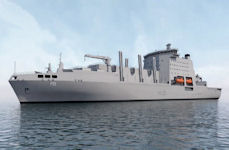Fleet Solid Support Ship - Design
 The principal role of the RFA is to sustain and support maritime forces at, as well as from, the sea. All of the RFA assets can integrate with warships as part of a task group.
The principal role of the RFA is to sustain and support maritime forces at, as well as from, the sea. All of the RFA assets can integrate with warships as part of a task group.
The civilian-manned Royal Fleet Auxiliary provides logistical and operational support to the Royal Navy worldwide. The fleet includes Solid Support Ships, which supply ships at sea with food, ammunition and spares (solid cargo). Fuel (liquid cargo) is carried by dedicated tankers. Equipment and personnel are transported on Landing Ships. Royal Fleet Auxiliary. The RFA has three Solid Support Ships: RFA Fort Austin, RFA Fort Rosalie and RFA Fort Victoria. Austin and Rosalie will leave service in 2023/24. The fleet solid support vessels are big enough to be built in block form, as the carriers were, with the work spread around the UK.
The definition of Full Operating Capability of the core Carrier Enabled Power Projection, to be achieved by 2026, did not include provision of a new Fleet Solid Support ship. However, the Ministry of Defence has been undertaking work to assess the way ahead for the Fleet Solid Support Programme and a Prior Information Notice was published on 22 July 2020 inviting potential suppliers to participate in a period of market engagement prior to the commencement of a new competition.
The carriers cannot be used on their own and need a range of support vessels to provide supplies and protection. In a conflict situation, for example, it would need anti-submarine warfare frigates, anti-aircraft destroyers, and hunter-killer submarines. Deploying Carrier Strike will therefore require a significant proportion of the Royal Navys fleet. However, the Department faces financial pressures and funding shortfalls over the next 10 years which could restrict investment in capabilities and upgrades.
The operational freedom of a carrier group relies on tankers supplying it with oil and water, and solid support ships providing food, ammunition and general stores, where and when they are required. The Department identified that it needed new solid support ships in 2005, and by 2017 it had decided that a fleet of three new support ships was necessary, entering service from 2026. Indeed, the Department told us that the fleet solid support ship programme was one of the four key components of its ambition to develop Carrier Enabled Power Projection.
The Department would have to think through how much spares and stores it must preload onto the carriers before they are deployed. It would also need to manage the consumption rates of stock and spares, depending on the environment the ship was operating in. Where necessary, it might also need to seek support from allies.
The solid support ship (AFSH) replenishes surface warships and auxiliaries with water, bulk ammunition, food and solid stores. The FSS programme will deliver the ships to provide the solid sustainment (food, stores and ammunition) that is required for Maritime Task Groups and Joint Forces to operate at the reach, tempo and duration to poise and deliver effects required by current Defence Policy1 . FSS is a key logistic enabler for Carrier Enabled Power Projection, providing highly mobile sovereign Access and Basing choices for Defence reducing the demand on the support chain and whist meeting ammunition movement and stowage regulations.
The FSS is a part of the MARS (Military Afloat Reach Sustainability) project that the MoD embarked on in the early 2000s to replace the ageing RFA fleet. Budget cuts drastically reduced the scope of MARS which originally included both the FSS and a separate Combat Support Ship Auxiliary (CSS(A)) to provide additional logistic support for amphibious operations. After the cuts of the 2010 defence review, the CSSA and FSS were merged.
The Fleet Solid Support Ships (FSS) will be 40-45,000 tons each, about the size of the US Navy's T-AO(X) T-AO 205 John Lewis. They will each be one-off, complex and specialist vessels in a funded £1-1.5bn program. The civilian-manned Royal Fleet Auxiliary provides logistical and operational support to the Royal Navy worldwide. The fleet includes Solid Support Ships, which supply ships at sea with food, ammunition and spares (solid cargo). Fuel (liquid cargo) is carried by dedicated tankers. Equipment and personnel are transported on Landing Ships.
RFA ships may be armed with an active weapons system for self-defence.5 Austin and Rosalie are equipped with the Phalanx close-in weapon to protect the ship from incoming missiles or enemy aircraft and a 20mm close range gun. The new FSS ships are likely to have a similar level of protection.
The Royal Navys £6.3 billion Queen Elizabeth class aircraft carriers will rely on the RFAs solid support ships. The centrality of the FSS fleet to the aircraft carrier program has been described by the Defence Science and Technology Laboratory an arm of the MoD in the following terms: "During high-intensity operations, the UKs new aircraft carriers and F-35 strike jets will rapidly consume the on-board stocks. It is critical that ammunition and other solid supplies can be replenished at sea to sustain the aircraft carriers during operations. Fleet Solid Support (FSS) will include new vessels to allow the UK to conduct sustained carrier operations worldwide."
The specification of the FSS order is still being developed. It is, however, likely that the inclusion of technology from the Heavy Replenishment at Sea system (HRAS) and the Highly Mechanised Weapon Handling System (HMWHS) will significantly improve the RFAs ability to swiftly replenish the Royal Navys aircraft carriers and F-35 strikeforce. Each FSS ship will carry more than 5 million items and nearly £1 billion worth of inventory.
|
NEWSLETTER
|
| Join the GlobalSecurity.org mailing list |
|
|
|

